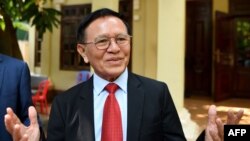The treason trial of Cambodian opposition leader Kem Sokha opened Wednesday, more than two years after his arrest in a case decried by his family as a "farce" and widely pilloried as politically motivated.
The 66-year-old co-founded the now-banned Cambodia National Rescue Party, once considered the sole viable opponent to the ruling Cambodian People's Party (CPP) led by strongman premier Hun Sen -- who has ruled the country with an iron fist for 35 years.
Sokha was arrested in 2017 and his party dissolved ahead of widely criticized elections the following year -- leaving the CPP to canter to victory virtually uncontested.
The opposition leader was first detained in a remote prison then placed under house arrest before his bail conditions were relaxed in November last year.
He stands accused of conspiring in a "secret plan" with foreign entities to overthrow the government, according to court documents -- charges he vehemently denies.
“There is no specific evidence," Sokha told AFP on Wednesday during a break in proceedings. "I want justice to come swiftly."
His lawyers say the case could take months. If convicted, Sokha faces up to 30 years in jail.
Police surrounded the Phnom Penh court on Wednesday morning as Sokha arrived for hearings.
Reporters and human rights monitors were barred, with the limited seating reserved for foreign diplomats and relatives.
Sokha's daughter Kem Monovithya decried the proceedings.
"This whole ordeal is a farce," she told AFP.
"It is damaging to Cambodia's image. We hope he will be acquitted, so Cambodia can begin to get back on a democratic path."
Amnesty International called the trial "a mockery of justice", while the US State Department has said the charges "appear to be politically motivated".
But government lawyer Ky Tech told reporters Wednesday there were more than two dozen witnesses and "suitcases of evidence" to bolster the treason charges.
Due to concerns over human rights, the European Union is reviewing whether Cambodia should be withdrawn from a tariff- and duty-free scheme.
If axed, it could deal a blow worth billions to the kingdom's lucrative garment sector.
While preferential access to Western markets is essential for some sectors, the kingdom's economy has been pumped up on Chinese investment and soft loans -- delivered without questions over rights and democracy.
To relieve international pressure, the government may reach for a compromise solution to the Sokha issue, according to political analyst Ou Virak.
This could come in the form of a royal pardon if Kem Sokha is convicted, he said.




